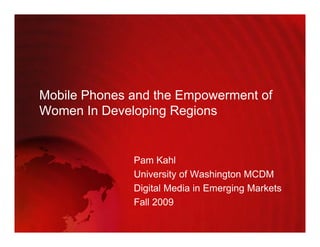Mobile Phones and the Empowerment of Women in Developing Regions
- 1. Mobile Phones and the Empowerment of Women In Developing R i W I D l i Regions Pam Kahl University of Washington MCDM Digital Media in Emerging Markets Fall 2009
- 2. Fertility Choices Ch i Tolerance for Domestic Violence EMPOWERMENT Economic Independence Decision Making M ki Autonomy
- 3. MDG3 Promote gender equality and empower women Education Political Employment Decision Opportunity Making
- 4. Key Findings ŌĆó Positive ŌĆó Ownership equivalent to five extra years of education ŌĆó Tool for economic empowerment ŌĆó Less tolerance for domestic violence ŌĆó Sense of possibility ŌĆó Less ŌĆó Fertility preferences ŌĆó Independent decision making ŌĆó Negative ŌĆó Source of distrust
- 5. SIMM Marketplace ŌĆō Grameen meets Ebay
- 6. UmNyango ŌĆō Spotlight on gender-based violence
- 7. CycleTel ŌĆō Family planning goes SMS
- 8. No Silver Bullet ŌĆó Phones and Airtime Cost $$ ŌĆó SMS requires literacy ŌĆó Aggravates gender conflicts ŌĆó No guarantee of access
- 9. Looking Ahead L ki Ah d ŌĆó Increased access to information and social connections improves sense of opportunity ŌĆó Positive indicators that economic empowerment can foster attitudinal shifts ŌĆó Must socialize new ideas with men as much as women ŌĆó Change takes time
- 11. Sources African Renaissance Ambassador Corporation. http://www.aracorporation.org/simm.html Biriwasha, M. (2007, Jan 12) Women Fight for Rights with Cell , ( , ) g g Phones. OhMyNews. Retrieved ttp://english.ohmynews.com Buskens, I. Webb, A. (Eds.) (2009). Buskens I & Webb A (Eds ) (2009) African Women and ICTs. Investigating , Technology and Empowerment Diga, K., Diga K Dev M Comm B. (2008). Mobile Cell Phones and M., B (2008) Poverty Reduction: Technology Spending Patters and Poverty Level Change among Households in Uganda
- 12. Sources Esipsu, I. (2009, Nov. 25) Mobile Phone to Partner in Family Planning Sunday Nation. Sunday Nation. Retrieved http://www.nation.co.ke Institute for Reproductive Health, Georgetown University [Powerpoint Document]. Retrieved from http://www.slideshare.net/IRHgeorgetown/family-planning- via-mobile-phones-proofofconcept-testing-in-india-cycletel Klonner, S. & Nolan, P. (2008). Does ICT Benefit the Poort? , , ( ) Evidence from South Africa
- 13. Sources Kutoma, W. (2008). [Powerpoint Document] The Internet and Mobile Telephony: Implications for WomenŌĆÖs Development and Empowerment in Zambia. Retrieved from http://www.mobileactive08.org/node/954 Lee, D. (May 2009). The Impact of Mobile Phones on the Status of Women in India Netsquared. http://www.netsquared.org/projects/sustainable- impact-mobile-microfinance-simm p
- 14. Photo Credits Associated Press Brendan Bannon/CARE Phil Borges/CARE Josh Estey/CARE David Rochkind/CARE











![Sources
Esipsu, I. (2009, Nov. 25) Mobile Phone to Partner in Family
Planning Sunday Nation. Sunday Nation. Retrieved
http://www.nation.co.ke
Institute for Reproductive Health, Georgetown University
[Powerpoint Document]. Retrieved from
http://www.slideshare.net/IRHgeorgetown/family-planning-
via-mobile-phones-proofofconcept-testing-in-india-cycletel
Klonner, S. & Nolan, P. (2008). Does ICT Benefit the Poort?
, , ( )
Evidence from South Africa](https://image.slidesharecdn.com/pamkahlemdmfinalpresentation-091205171643-phpapp01/85/Mobile-Phones-and-the-Empowerment-of-Women-in-Developing-Regions-12-320.jpg)
![Sources
Kutoma, W. (2008). [Powerpoint Document] The Internet and
Mobile Telephony: Implications for WomenŌĆÖs Development
and Empowerment in Zambia. Retrieved from
http://www.mobileactive08.org/node/954
Lee, D. (May 2009). The Impact of Mobile Phones on the
Status of Women in India
Netsquared. http://www.netsquared.org/projects/sustainable-
impact-mobile-microfinance-simm
p](https://image.slidesharecdn.com/pamkahlemdmfinalpresentation-091205171643-phpapp01/85/Mobile-Phones-and-the-Empowerment-of-Women-in-Developing-Regions-13-320.jpg)
